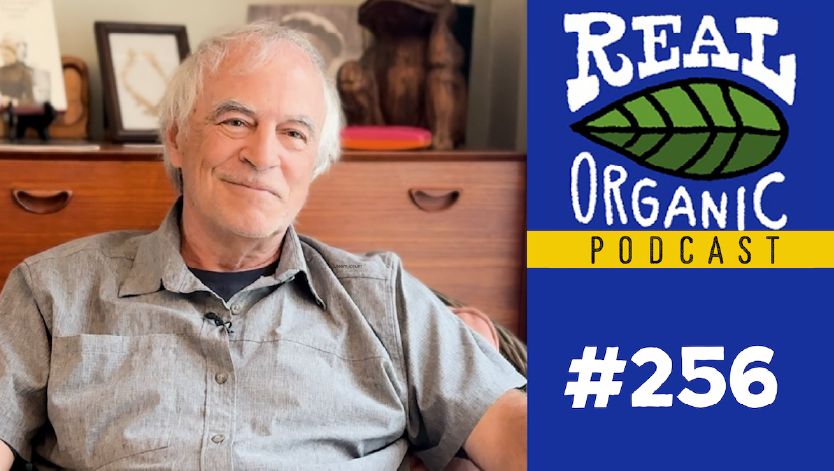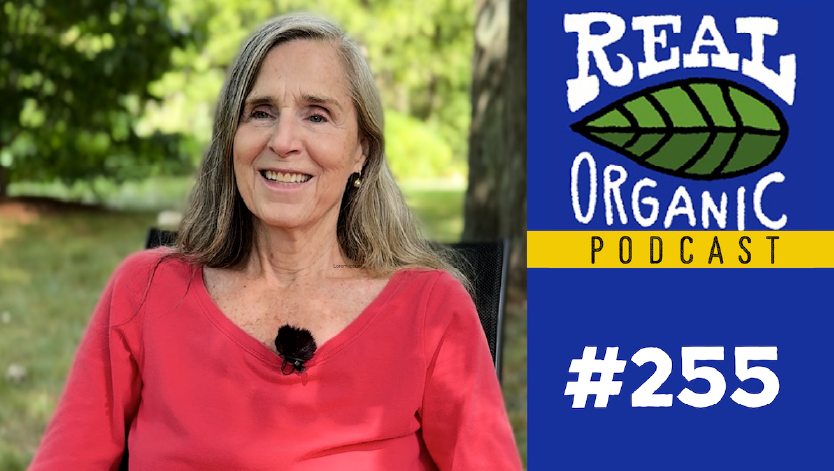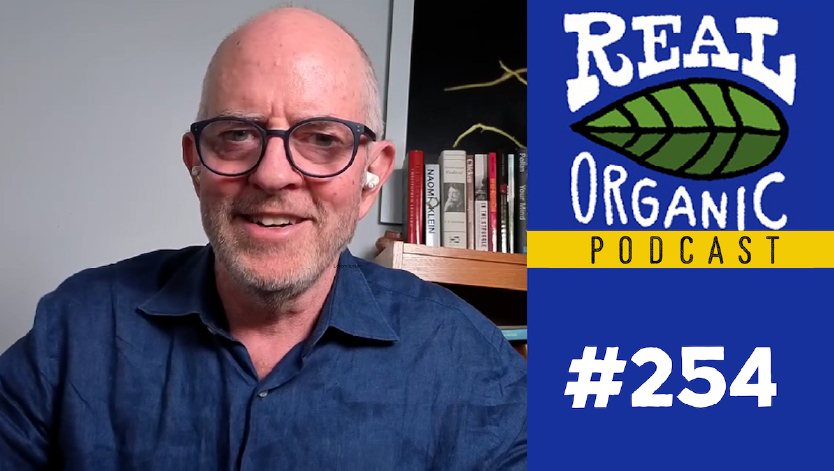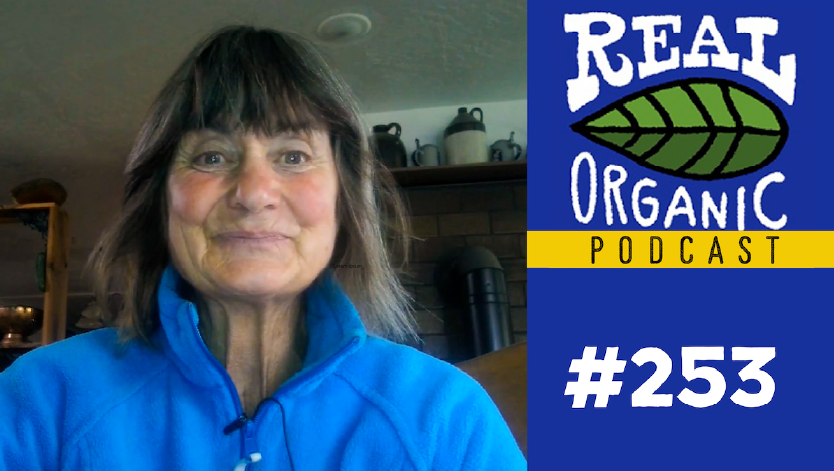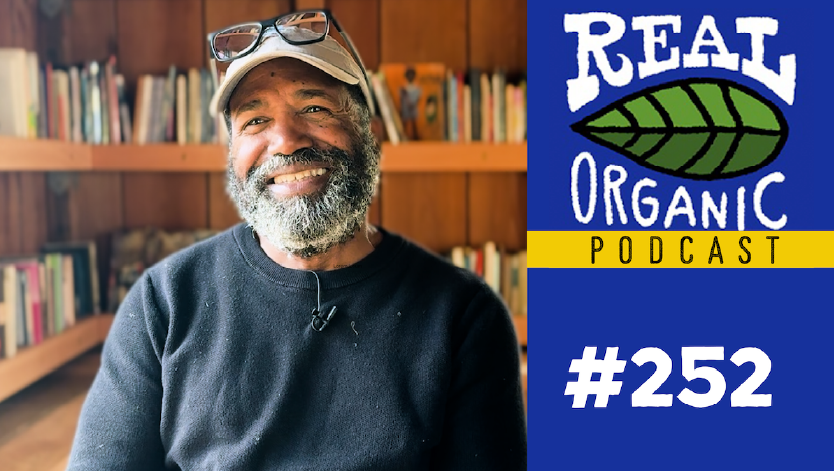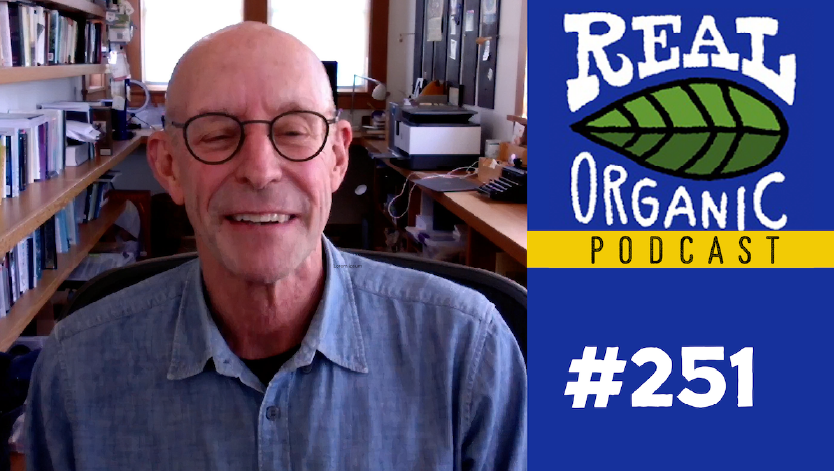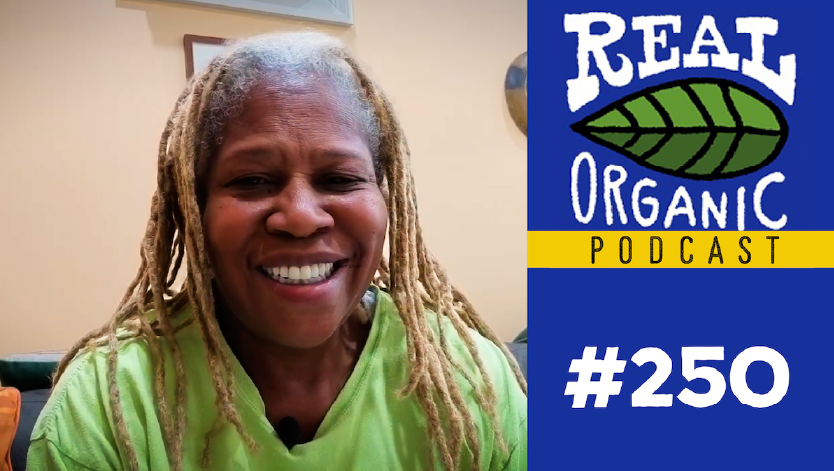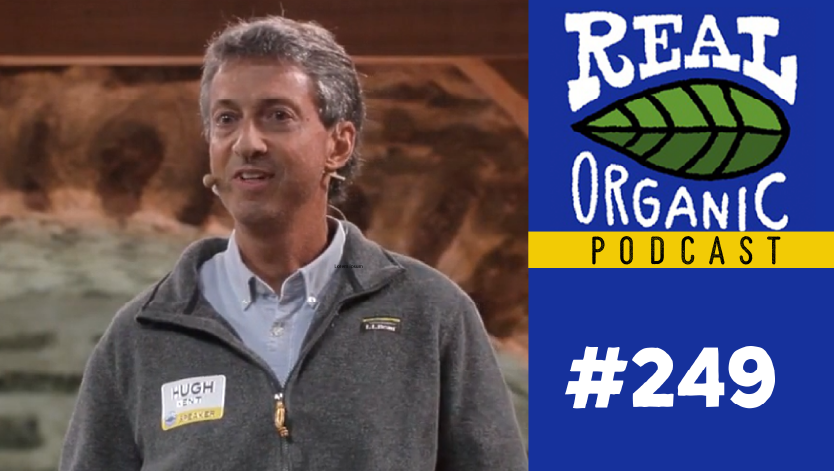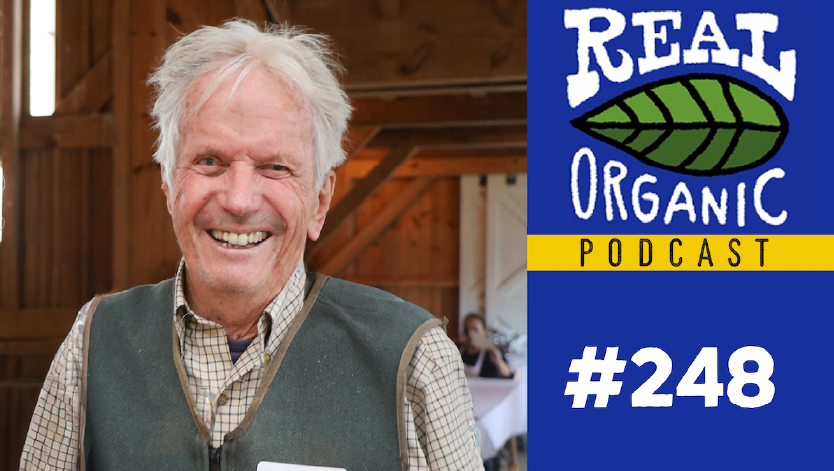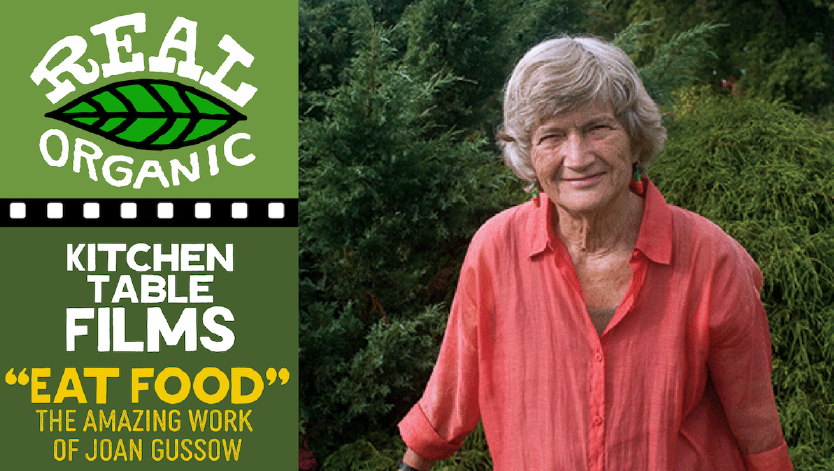Episode #245
Saving Real Organic: Linley + Dave At Churchtown
Recorded live at the Saving Real Organic conference at Churchtown Dairy in Hudson, New York, this episode brings together the voices of Real Organic Project co-directors Linley Dixon and Dave Chapman — two leaders at the heart of the farmer-led movement to protect the integrity of organic farming. Linley opens with a powerful address on the failures of USDA oversight and the rise of fraudulent imports, hydroponic “organics,” and confinement livestock operations. Dave follows with a reflection on the pioneers who built the organic movement and the responsibility we now carry to keep their torch burning. Together, their talks remind us that Real Organic is more than a label — it’s a living community rooted in soil, integrity, and collective courage.
Our Linley Dixon and Dave Chapman talks were recorded live on stage at the Saving Real Organic Conference at Churchtown Dairy on September 27, 2025:
You can subscribe and download episodes of our show through your favorite podcast app, our YouTube channel, or stream the audio-only version here:
Linley Dixon live on stage at Churchtown Dairy, September 27, 2025: Why We Need A Real Organic Project:
Linley Dixon 0:01
Our next speaker is Linley Dixon. The good Dr. Dixon is my co-director at the Real Organic Project, as I’m sure you all know. The work we do together… We have a wonderful team, but the one team member I work most with by far is Linley, and pretty much every day we talk, commonly for hours. That might seem like a waste of time, but it is not.
Dave Chapman 0:29
We do so much work together, and I learn so much from her because she knows a lot about areas I know very little about. I’m a high school graduate; she’s a PhD in soil science, which is something that we all need to know a bit more about. It’s been a privilege for me to work with her all these years, and now she will come and give her talk. All right, thank you.
Linley Dixon 1:15
Can you all see the first slide? Okay. About all those farmers that have come, I wanted to highlight one. Theresa Krtek, are you here? There she is, okay. She came all the way from Pescadero, California. We met her at EcoFarm. We often have farmer gatherings when we’re traveling around the country, and we had a Real Organic gathering at EcoFarm.
Linley Dixon 1:41
We had a woman from Common Ground there, and she was preaching no-till. She wasn’t a farmer. When it came to Theresa Krtek, she kind of boldly spoke up, which is what the organic movement is always about and something I’m really proud of. We speak our minds, and we do it often in the face of authority and people with a lot of power.
Linley Dixon 2:05
But here we were in a group of friends, and Theresa just said, “I was assaulted when I watched your film.” She said, “You obliterated the entire story of the organic movement that wasn’t part of it.” I feel like we are at a time right now when we need to be really careful because the USDA has failed us. For a long time, we worked behind the scenes in the organic movement to fix it – for twenty-some years now – and we have had a lot of failures.
Linley Dixon 2:46
I think it’s time to start talking about it out loud. But that doesn’t mean that we are abandoning everything that has come before us. That’s why the stories of the pioneers are so important right now, because there’s a reason why we went through the whole process of getting organic defined by law, and we did a good job.
Linley Dixon 3:07
If you read the language of the Organic Foods Production Act, it looks like a lot of what the regenerative movement is preaching right now. I understand why there is a regenerative movement. The USDA has been completely affiliated with that word organic.
Linley Dixon 3:24
I think the young farmers have forgotten, or they haven’t been exposed to the fact that it really is a farmer-led movement from the beginning, and so it’s our job to keep telling that story and making those connections so that we can again learn from those lessons that the movement had to actually define, by law, what the word meant.
Linley Dixon 3:50
What we’re doing here today – speaking out loud, speaking truth to power – is very much a part of the organic movement, and it’s very radical. But radical means “first.” So it’s the first root to break out of the seed. Growing organically in itself is radical. It’s only one percent of agriculture right now that’s certified organic.
Linley Dixon 4:11
I believe it’s a lot higher percentage. A lot of organic farmers are out there and are not getting certified, so I think it’s underreported. But even still, it’s radical to grow organically. It’s only one percent.
Linley Dixon 4:12
Calling out the USDA for not enforcing the organic law is really radical, because our farms depend on the success of that label, and we’re saying it has problems, and we’re saying it loudly. It’s really hard to be first. We did get cease-and-desist letters from our friends in the organic movement, but we have to break new ground right now.
Linley Dixon 4:45
Others will shun us for speaking the truth, but organic has always been a movement that speaks that truth to power, and by doing so, we’re going to break ground for others to follow us. Because what follows that radical root? A blossoming tree.
Linley Dixon 5:01
If we can do it again, as Eliot Coleman raises this, “We did it once, we can do it again,” we can restore meaning to that word that we feel has gone so astray.
Linley Dixon 8:44
I feel that the organic movement of farmers is always pushing ourselves to be better, and the law and the standards are always going in the other direction. There’s always this pressure to weaken the standards, and that divide is just getting too big right now to stay silent.
Linley Dixon 8:44
Ed and Rosie from Sova Farms really wanted to be here. First, they said, “Oh, why are you doing this in September?” If you were here the first year, it was October it was freezing. We love this venue. It’s so beautiful, and there are so many farmers who are going to listen to these recordings afterward. They said, “We need to be so much louder about the Real Organic Project.”
Linley Dixon 8:44
We have customers coming up to us and saying that we need to mimic the marketing of The Country Hen. The Country Hen, if you read our letters, you know, was the first operation to sue its certifier for not giving it organic status because they completely enclosed their chickens in a barn. They now have those cement porches that allow for outdoor access, but at the time they didn’t even have those.
Linley Dixon 8:44
This was back in 2002. The USDA sided with The Country Hen, unfortunately, and they’ve had the organic label ever since. Could you imagine how hard it would be to be a farmer and have someone come up to you and say, “Look at this great marketing. Can you do better at marketing your eggs?” when you know that their chickens are in complete confinement? Ed and Rosie are rotating chicken houses on pasture.
Linley Dixon 8:44
We need to be louder about this. Organic policy experts have worked for decades to get rid of this rule. Something was passed in 2023 to try to change this – to actually get chickens out of those enclosed concrete porches.
Linley Dixon 8:44
This is Herb Brooks in Michigan. Senator Debbie Stabenow from Michigan fought this rule for a long time. The unfortunate thing is that these are pretty much two-story buildings. These chickens don’t go outside at all. The unfortunate thing is that the operations already certified organic have until 2029, so something like this doesn’t have to make the changes even though the law was passed.
Linley Dixon 8:44
I don’t feel great about the language right now. Correct me if I’m wrong, in five years, if these operations all have chickens – there are millions of chickens in these barns running around – and actually, you can get a third of your diet if you’re a chicken from pasture, and you can eat insects and stuff like that too, and scratch and bathe.
Linley Dixon 8:44
If you read the websites of these operations, they’re talking about foraging behavior, and this is all inside concrete barns. I will walk away from this job if Herbruck’s Poultry Ranch actually has millions of chickens running around eating a third of their diet from pasture, because then we won. But I just don’t see anything changing with how hard we’ve worked to change the laws.
Linley Dixon 8:44
These are the farmers that it’s hurting. This is Cameron Molberg. We wrote about him in a newsletter not so long ago. One of the really cool things that we’re doing is starting to highlight farmers where you can actually find their food across the country. After we talked about Cameron Molberg, he was able to sell a lot of his chicken, which he delivers online to your doorstep. That’s one of the things that the Real Organic Project can do.
Linley Dixon 8:44
But it’s not just poultry. In the three years after the 2017 exposé about CAFO dairy that Peter Whoriskey published in The Washington Post, the number of CAFOs in Texas doubled, and in Wisconsin, we went on to lose one hundred family-scale dairies. They’ve only gotten bigger, and we’ve only gotten smaller.
Linley Dixon 9:05
The same thing has happened in Vermont. I’m looking at Nicole Dehne here. She’s the director of Vermont Organic Farmers. I’m going to embarrass her. She’s under that purple and blue rally tent here, marching for soil health. We interviewed her this year, and she said that the same thing is happening in Vermont.
Linley Dixon 9:22
We are a connected marketplace. I think she said, “We went from two hundred organic dairies in Vermont to one hundred twenty.” As high integrity as VOF has, the fact that there are organic CAFOs in Texas is affecting the success of their farmers.
Linley Dixon 9:40
This excellent investigative reporter found a shipment of grain that got switched over to organic magically with some paperwork overseas. When asked how he was tracking the ships, he said it was easy, so the USDA is just failing to do it.
Linley Dixon 10:00
These are the farmers that it’s hurting. This is Scott Myers. Scott was going to try to be here too. Did he make it? He had a grain delivery in the region and was going to try to get over. He has an incredible podcast. He has firsthand stories of grain fraud.
Linley Dixon 10:20
He had a buyer call him and tell him this story, and everybody should listen to it. A buyer was given a tip that the grain he was about to unload off a ship and buy was fraudulent. This was Perdue Agribusiness. I’m actually going to tell you, it makes him look pretty good because he had integrity. So, he called the NOP and said, “I’ve been given a tip that this ship that’s organic is fraudulent.”
Linley Dixon 10:49
They checked the paperwork, and they said, “Nope, the paperwork is good. Go ahead and buy it.” So, they bought the load, and they tested the grain. It tested positive for fungicides. He called them back and said, “This is hot. What should I do?” They said, “The paperwork checks out. No problem. It’s fine. Go ahead and sell it.”
Linley Dixon 11:10
They had integrity. They put it into their non-GMO line. Remember, everybody, non-GMO means pesticides are still used. It’s not as good as organic. A lot of customers are looking for that label instead right now. The point is, as long as the paperwork is good, the National Organic Program is good.
Linley Dixon 11:27
We have been working really hard, Scott Myers in particular, to pass something called OIVA, the Organic Imports Verification Act. We shouldn’t have to pass that law. In Europe, they’re testing the grain all the way throughout the supply chain. Every buyer, when things exchange hands, is testing it, and the sellers are showing them the test results. There’s integrity throughout the supply chain because their reputation depends on it.
Linley Dixon 11:55
Here, we’re just saying, if the paperwork’s good, go for it. Scott Myers had another story. He had the opportunity to travel to Argentina to visit a mill, and there were two piles of organic grain. One was organic, and the other was NOP – National Organic Program.
Linley Dixon 12:19
Scott raised his hand – he’s very polite – and said, “Would you mind telling me what the difference is between these two piles as an organic grain grower in the States?” They said, “Well, we know the NOP grain won’t be tested, so we separate it here.” That’s outrageous. That’s just sad. This is well known throughout the world – that the NOP can be the dumping ground for fraudulent grain.
Linley Dixon 12:42
This is a graph showing how much imports of organic grain have changed since 2012 – they’re skyrocketing. We are completely exporting our organic agriculture outside our country. This is a land of agricultural exports, so there’s no reason why our farmers can’t convert. They’re not converting because there’s no market for them. So, organic farmers aren’t surviving.
Linley Dixon 13:09
Our farmers are intelligent. If there is a market for them, they will convert their farms. They’re just not converting because the marketplace is not working for them. Where is all this fraudulent grain going? To the organic feedlots. That shouldn’t be two words that I can even put together – organic and feedlot. This is just so wrong.
Linley Dixon 13:32
QAI is one of the least trusted certifiers. They put out a list saying, “Here are all the ingredients that we suspect are highly fraudulent.” The NOP is warning certifiers about fraudulent organic soybeans. They’re now coming in from West Africa. It used to be the Eastern Bloc countries and Turkey. Scott Myers saw it in Argentina. It’s shifting. They figure out where to do it from.
Linley Dixon 13:59
We need to stop passing the buck. The USDA is pointing at the certifier, saying, “Do your job.” The certifiers are pointing at the USDA, “It’s not my fault. You do your job.” Meanwhile, no one’s being held responsible.
Linley Dixon 14:21
These are the soybeans intercropped with rye from Scott Myers’ fields. These are the incredibly intelligent farmers who are being harmed. After the soybean harvest, Scott will roll or crimp the rye down, creating a mulch. Into that rye mulch, he plants winter wheat, then he frost-seeds red clover to provide fertility for the following corn crop.
Linley Dixon 14:45
Sometimes he includes a three- to four-year rotation of hay, but the organic dairies have been failing in his region, so sometimes there are no dairy farmers to buy his hay. His entire farming system is dependent on the success of his regional farming. He farms in a sea of government-subsidized chemical corn and soybean production.
Linley Dixon 15:13
A common reason I hear from farmers for why they become organic is because when they plant fungicide-treated seed, there are dead birds all over their fields afterward – birds that have been eating the seed and following the tractor. That’s a really common reason.
Linley Dixon 15:31
So, farmers know the chemicals they’re using are harmful. They don’t like it; they want to be organic. We just need to create a marketplace that works for them.
Linley Dixon 15:44
I remember in Marion Nestle’s podcast that Dave did with her, she said, “It’s not radical to shift to support organic. We’re already supporting a chemical system. We just shift to support a different system. This isn’t radical thinking.”
Linley Dixon 16:02
These are the beautiful sunflowers that Scott grows in his rotation. When the organic laws work, they prevent sunflower oils from being extracted with hexane. Hexane is a highly toxic substance. So, we need laws – we just need them to work for the farmers.
Linley Dixon 16:20
We need them to be enforced. He does use tillage to incorporate all this biomass. Exactly what Eliot was talking about- this is a lot of biomass. You have to incorporate that clover to prevent the need for fertilizers for the corn crop. That’s a heavy feeder.
Linley Dixon 16:35
I always tell people this because I do have a background in mycology: Mycorrhizae will survive and thrive with the plow. Mycorrhizae aren’t the only fungi we should be thinking about. There are all kinds of fungi that break down organic matter. These are roots, and those little thin shreds are the hyphae – they’re stained blue – and the circles there are the spores.
Linley Dixon 16:59
The hyphae will survive in the roots for up to six months, and the spores will survive in the soil for up to ten years. Mycorrhizae thrive under tillage. I think it’s a big distraction because most of chem no-till is chemical no-till. The fertilizers are applied to the surface, which then run off even faster than if you incorporate them into the soil.
Linley Dixon 17:25
A lot of cracking goes on in the soils on these chem no-till farms because the soil isn’t healthy, and when you surface-apply fertilizers, when it rains, they run right down those cracks into the drainage tiles. We’ve never seen eutrophication like we’ve seen with the spread of chem no-till. Make sure you add the word chem, chemical, to the words “no-till.”
Linley Dixon 17:47
We have incredibly radical language in the law to back organic systems. An organic plan shall contain provisions designed to foster soil fertility primarily through the management of the organic content of the soil. This looks like a very regenerative law. We already have it.
Linley Dixon 18:08
I know it’s confusing to be an eater. This is Kristin Kimball. If you haven’t read “The Dirty Life: A Memoir of Farming, Food, and Love” and “Good Husbandry: Growing a Family on a Community Farm,” they are my favorite books.
Linley Dixon 18:20
First, you hear tillage is bad, then you find out that no-till means more chemicals. Then you find out that grass-fed is just confinement with chemical GMO beets as feed. Kristin Kimball presented here at Churchtown Dairy that farms produce what people eat. You have to be informed if we’re going to fix this.
Linley Dixon 18:40
We’re your trusted source for that. It’s the organic farmers who have always pushed us to do better. I want to take her statement a step further and say that people eat the food the government subsidizes, and that’s what we’re going to be talking about today – how to fix that. It’s both personal responsibility and also a food system that’s heavily propped up against us.
Linley Dixon 19:07
I had the opportunity to sit down next to a Driscoll’s sustainability expert at the Sustainable Foods Summit last year. When they found out what my presentation was, I found out later that I probably wouldn’t have been invited. But I did have the opportunity to talk about the plastic use in hydroponic systems.
Linley Dixon 19:28
I spend a lot of time on Google Maps looking at what these organic facilities look like. You can find these all over the world. They’re expanding rapidly. They laser level valleys and come in and have plastic upon plastic.
Linley Dixon 19:44
In California, when it rains on these systems, there’s so much plastic that when it does rain, it runs off the plastic and then causes just massive erosion. Some landowners have wised up and stopped renting to this type of hydroponic farming.
Linley Dixon 20:00
But I was asked to sit down next to this Driscoll’s sustainability expert and work it out after both of our presentations because he had come to the sustainability conference to talk about their plastic savings in their packaging, and we were all supposed to applaud that.
Linley Dixon 20:19
So, we sat down to work it out, and I said, “I think we can come to some sort of understanding if you’ll just acknowledge that what you do is hydroponic production. All of the fertility comes through liquid feed into these tiny pots of coco coir.” He said back, “Your definition of hydroponic is different than mine.”
Linley Dixon 20:38
You can’t make up definitions for words. That’s like saying this barn isn’t round because your definition of round is different than my definition of round. Our conversation didn’t last very long because he wasn’t even willing to be transparent about their practices.
Linley Dixon 20:57
We’ve tried political reform. That’s Fred Kirschenmann next to me there, an organic champion that we just lost two weeks ago. We had just been rallying in Boulder a few weeks before that – we failed. So, we said we are going to have to do this ourselves until we can fix the government.
Linley Dixon 21:16
This is our first Real Organic Project Standards Board meeting. There are several of you here that I’ve seen. We created an add-on certification to USDA Organic – a conversion of the whole farm to organic practices.
Linley Dixon 21:30
Now, because we have so many Noah’s Ark farms, as long as you are using organic feed, we allow some of those really diverse farms not to certify their entire operation because it’s becoming so expensive. You have to certify your crop scope. Then if you have some livestock, you also have to certify your livestock under a different scope. Each scope, for me, depends on your gross. Now, just for vegetables, it’s $2,200.
Linley Dixon 21:58
There was a big scare about whether Cost Share, which is something that the USDA supports, $750 per scope paid back to the farmer the following fall, was going to come through this year. It looks like it’s going to come through, but a lot of small farmers left the label because of that. We are trying to come up with a standard that works for farmers who have completely committed to organic but that isn’t so expensive for them to go through the certification process.
Linley Dixon 22:28
Organic practices, whole farm conversion, worker protections, and, of course, soil health and pasturing of animals. We have thousands of farms that have joined us across the country. We are forming wonderful farmer gatherings.
Linley Dixon 22:44
I just wanted to give some pictures of the beautiful farmers that we are interviewing. Liz Graznak has an incredible story of losing a third of her markets because of the loss of the Local Foods Promotion Act. Seth even wears his hat when he’s not being interviewed by us. There he was being interviewed by the Gulf of Maine Research Institute, and I saw him wearing his hat. So, they’re out there representing us.
Linley Dixon 23:07
I just want to put a picture of my incredibly inspirational daughter who loves to open water swim – this is her in a race – and point out that because of fertilizer runoff, half of the freshwater in our country is unswimmable. Around the world, half of the countries don’t have any freshwater that you can swim in.
Linley Dixon 23:28
This is the picture in 1984 of a region in Brazil. This is it now. When we say we’re not going to sell soybeans to China anymore, where do they source it from? Brazil. That’s where they’re getting their soybeans from. Our policies affect the landscape, and we are now a globe that needs to start thinking that way. We can’t just think about our own country.
Linley Dixon 24:00
In the U.S., we burn 20 million barrels of oil a day; globally, 100 million. The fact that we have any fossil fuels to burn is because of photosynthetic capture over hundreds of millions of years. We are burning that in decades. Say that to everyone you know.
Linley Dixon 24:23
We are taking the photosynthetic capture over millions of years – 60 million years in the Carboniferous Period, 300 million years ago – it was buried because there were wetlands and the trees just didn’t break down. They got buried into wetlands where they didn’t decompose. That’s the only reason why it’s there. Over hundreds of millions of years, we are releasing that in decades – that is too fast.
Linley Dixon 24:49
The oceans are buffering about a quarter of that. They’re creating the carbonic acid Eliot was talking about. Instead of dissolving rock on the soil surface, making fertile soils in the ocean, it’s dissolving our coral reefs.
Linley Dixon 25:02
I married a fisheries biologist. That’s my daughter and me. The one time we actually got away from the farm, my husband got to show us where he did his research. We are witnessing an ecosystem that’s going to be gone within our lifetime – within my lifetime, not just hers – because of the carbonic acid.
Linley Dixon 25:27
Organic farmers always know that the complexity of the natural world is so much more beyond what our little brains can understand. We can’t go out there and measure what’s going on in the soil when we only know what one to two percent of the organisms are, never mind what they’re doing.
Linley Dixon 25:46
When you learn the solar system, I imagine this is not what you pictured the solar system looks like, but it is. That’s the sun bulleting through space. The planets are orbiting in a helix around it. The world is a complex place, and organic farmers have the humility to say, “We have no idea what’s going on, but we know that the systems that we are using on our farm are working within the systems of nature that have evolved over 4 billion years.”
Linley Dixon 26:19
Life evolved on life. One species evolved to eat up the excrement from another species. We need to be thinking about these cycles, and that’s what organic farmers do. We are cycling the nutrients on our farm. We don’t know what’s happening. We can’t measure it. We know it tastes better, but we can’t say, “This is more nutritious,” because it’s too complex.
Linley Dixon 26:43
There are 40,000 or more things that we would have to measure, and we don’t even know how to extract them and then run them through a machine and tell you how much. One blueberry on the same plant is going to be different than the blueberry growing right next to it. So, we can’t prove it to you, but we know that it’s true because we’re working within nature’s systems.
Linley Dixon 27:05
We have the answers. Just allow us to do our jobs. Let’s come up today with a system to support us instead of continuing to hold us back. Thank you.
Dave Chapman live on stage at Churchtown Dairy, September 27, 2025:
Linley Dixon 0:00
Our last speaker is my co-director. Dave and I met while fighting and rallying together, and when we all bemoaned our loss and cried, he brought us back together and said, “Okay, what are we going to do?”
Linley Dixon 0:15
Does anybody study complexity theory? Dave’s mind has made me want to study complexity theory. Every morning, because I’m two hours earlier than him, I usually have to catch up to where he’s been all night in his brain. One of the cool things that you learn when you start taking a look at what they’re studying is that there is what’s called a dancing landscape.
Linley Dixon 0:38
What might be right to do in one moment – it’s like the mountains shift around – might be a different mountain to climb the next day. That’s what it’s like working with Dave. We’re always trying to figure out how to make a difference. Dave Chapman.
Dave Chapman 1:04
Thank you. Am I on? Does that sound good? It’s a pretty amazing day for me. I’ve learned a great deal that I don’t even know what I’ve learned yet. It will take a while to digest it. Fortunately, we’ve recorded it, so we get to hear it again.
Dave Chapman 1:23
This is like a pop-up community. People are here from 28 states and six countries. So far, we’ve been doing this once a year, and it’s pretty great. I think it gets better every year. I wanted to talk about pioneers. A lot of people have been talking about pioneers today. We lost two of our pioneers this year – Joan Dye Gussow and Fred Kirschenmann.
Dave Chapman 1:53
I imagine most of you didn’t actually know them personally, but some of you did, for sure. They started in the early days when it was extremely unpopular for people to be talking about organic. You took a lot of heat for that.
Dave Chapman 2:12
I remember Bill Liebhardt, who was the first scientist at Rodale, I believe. He came from the University of Maryland, and he said that when he would go back to Maryland, back to the university, his former colleagues would literally cross the hall and look the other way as they walked by him. It was a price you paid.
Dave Chapman 2:32
Now that’s not the case. Now, as Jim said, he came in, and there was a whole market of people who wanted to buy organic. Things have gotten better, but it was hard in the beginning, and Stuart Hill said those people had to be pretty tough – and they were tough.
Dave Chapman 2:50
I have one little story about Joan. I’ve told this before, but I was at a dinner with her at Stone Barns – such a privilege. Eliot and Barbara were there. I was driving her home across the Tappan Zee Bridge. I remember it vividly – the blue lights. Joan looked at me and, very thoughtfully, she said, “Are you optimistic about what you’re doing?”
Dave Chapman 3:20
I was a little taken aback that she wanted to know what I thought. I said, “No, Joan, I’m not, but I’m hopeful.” She thought for a moment and said, “That’s about right.” So, we have this dance that we do between optimism and hope. I’m still not optimistic.
Dave Chapman 3:43
Yvon Chouinard said that a sense of agency is much more important than a sense of optimism. I think that’s true. A sense of our power – of what we can do – is more important than a sense that everything is going to work out well, because it probably won’t. But that doesn’t mean that we can’t keep working, keep trying, and keep changing things.
Dave Chapman 4:08
I feel like those pioneers carried torches and passed them on – or they lit our torches. It’s better that they light ours, because they multiply. People like Joan and Fred taught a lot of people – inspired a lot of people.
Dave Chapman 4:26
My favorite Fred Kirschenmann story is: Fred was up on a stage like this, giving a talk like this, and somebody called out and said, “Well, Fred, what would you do if you were the Secretary of Agriculture?” He said, “Well, that all depends on how long I wanted to be Secretary of Agriculture.”
Dave Chapman 4:48
It’s a funny comment – he was pretty sharp – but it’s also a true comment, and it’s what we face constantly. If we hope some hero is going to come and become Secretary of Agriculture and save us, it ain’t going to happen, because it’s not about one person and it’s not about a hero or a villain. It’s about a whole system that demands that that person act in a certain way, regardless of what they believe. If they act differently, they will be replaced very quickly.
Dave Chapman 5:23
We have other pioneers here today: Eliot Coleman, Barbara Damrosch, Marion Nestle, and Abby Rockefeller. They’ve all been the tip of the spear. They’ve all been saying things long before they were popular to say. When you do that, you were considered a wacko or a weirdo. That’s what my Facebook page says: “Wacko in Chief at the Farm.” But I think it’s true, and it’s hard.
Dave Chapman 5:57
I didn’t have it that hard because they were there before me, and so that was their gift to all of us. But that gift comes with a responsibility and a requirement, which is that, okay, we’ve been given a torch. Now it’s our job to respect that and carry the torch on to the next generation, and to light their torches. That’s how movements grow. It’s not by saying, “They did a good job.”
Dave Chapman 6:28
That’s why I was so uncomfortable yesterday when somebody asked me about being a leader. I don’t feel like I’m a leader; I feel like a servant, honestly. I’m trying to serve, and we all have that responsibility. It’s not particularly glamorous, but it is particularly rewarding. I eat really well, and I have really good company.
Dave Chapman 6:54
Organic is a political movement. Organic farming has been going on for thousands of years, but it formed as a political movement in the 1930s and 1940s as a response to chemical agriculture. Chemical agriculture at that point looked like regenerative agriculture now. Regenerative agriculture often is chemical, but it was so benign compared to where it is now.
Dave Chapman 7:26
Things have gotten so much more extreme as the pesticide industry has ramped up. They didn’t even have herbicides in 1935, and now it’s a major thing. We all have glyphosate in our blood.
Dave Chapman 7:39
One of the things that made it obvious that this is a political movement is that we’re facing opposition from large economic interests, and their major tool is disinformation. I interview many people. One of the people I interviewed recently was Naomi Oreskes, who wrote a book called “Merchants of Doubt: How a Handful of Scientists Obscured the Truth on Issues from Tobacco Smoke to Climate Change.”
Dave Chapman 8:07
It’s an excellent book about the disinformation of the tobacco industry and also of Big Oil dealing with climate. We’re all prone to misinformation. We all say things that we thought were true, and they’re not true. The difference is, for these people, they know that they’re not true.
Dave Chapman 8:27
The tobacco industry knew for a fact that smoking was very bad for your health, and they knew it was addictive because they were working to make it more addictive. That’s disinformation, and that’s what we have to contend with. We can curse and swear about it, but the truth is, that’s just part of the job here. We’re going to have to do better than that.
Dave Chapman 8:52
I wanted to just mention this question about certification. Another pioneer was Lady Eve Balfour. She was a contemporary of Albert Howard and Louise Howard. Lady Eve started the Soil Association with others in England, and it was one of the first organic organizations in the world. She was great.
Dave Chapman 9:19
Eliot knew her, and he would take tours over to England, and they might have a stout and have a pint with her in the bar. One of the lefty people on the tour came to Eliot after they’d been drinking for a while and said, “Man, if that’s the aristocracy, we need to get us some.”
Dave Chapman 9:43
She was pretty great. She didn’t think that certification was a good idea because she thought that bringing money into it was going to twist the meaning of organic and cheapen it – and that’s exactly what’s happening, right? You go, “She was right.”
Dave Chapman 10:04
She had a debate with Patrick Holden, somebody I interviewed, and he’s a good guy. He said, “No, we need to have certification, because I need to make a living as a farmer. I’m a farmer, and I don’t have independent means, and some kind of certification is how I’m going to be able to create a marketplace. That’s how this is going to grow, and other people can create a marketplace, and it grows and it grows.”
Dave Chapman 10:34
These two apparent polar opposites, I think that they were both right. We have to deal with that contradiction as we go forward, which is how we’re going to find each other if we don’t know each other.
Dave Chapman 10:47
I sell into a wholesale market; JM sells entirely to people he can look in the eyes. I don’t see the eyes of my customers, and I’m sorry about that. I used to do the same, but for other reasons, I decided to become somebody who grew tomatoes and wholesaled them, like Hugh and Lisa Kent.
Dave Chapman 11:06
As a result, those people need to find some way of trying to decide, “Am I really organic?” Unfortunately, the USDA label no longer signifies that for me. After we lost in Jacksonville, I thought, “Well, maybe I’ll drop certification because that’s saying I’m the same as a hydroponic tomato. I don’t believe it.” I do still believe in certification, and I do believe that we have a terrible problem with corruption of certification.
Dave Chapman 11:47
We have to deal with monopoly, which is why hydroponic got approved by the USDA. It was absolutely because Driscoll’s used the incredible amount of influence that they have to influence that decision. They weren’t working at the level of the National Organic Program; they were working at the level of the inner circle of Secretary Vilsack, and the word came down about what was going to happen.
Dave Chapman 12:17
When I came to realize that – at first I didn’t know that – I thought, “Oh no, no, no, we’re just dealing with this one company.” We didn’t even know Driscoll’s was growing hydroponically, which, of course, they still say they’re not, because they, as Linley said, redefined the word.
Dave Chapman 12:31
Okay, that’s why this is a political movement. That’s why things like disinformation are important. That’s why what happens on somebody else’s farm impacts everybody here. What happens on our farms impacts everybody.
Dave Chapman 12:49
And what happens with sewage sludge, which is an industrial waste, impacts our farms. The fact that it’s being spread is entirely a political decision, and the reason that it passes is because of these large, powerful monopolies, as Zephyr said.
Dave Chapman 13:08
Driscoll’s is over 70% of the organic berries sold in America. That’s a greater percentage of the organic berry market than Standard Oil had of the oil market when they broke it up. The reason they broke it up wasn’t because oil was so gosh-darn expensive; it was because democracy is threatened when we have so much power concentrated. I recommend you read Zephyr’s book and Austin’s book to get a deeper look at this, because they’re pretty good.
Dave Chapman 13:43
I was talking like this at a rally. I was on a hay wagon instead of a stage. It was going pretty well, and somebody called out, “What can we do?” Honestly, I was floored, because I did not have a good answer for that. I’m really good at talking about the problem. That’s why I’m not crazy about being the last speaker, because I’m supposed to give some hope here. I was better at saying, “We got a problem right here in River City,” which we do.
Dave Chapman 14:19
I gave a terrible answer. I said, “You can write a letter to the USDA,” which I had done many times – and with no positive impact. I’d met with the head of the National Organic Program. I’d met with his boss, who was the head of the Agricultural Marketing Service. I’d met with her boss’s boss’s boss, who was Secretary Vilsack – all for naught. It was a good try, but reform appeared to be not likely.
Dave Chapman 14:49
I’ve thought about it since – “What can we do?” – a lot, and of course, the biggest answer I came up with is that we could form the Real Organic Project, which I did not do alone. Many, many farms and farmers came together.
Dave Chapman 15:03
The very first meeting, there were 30 farmers in Vermont, and then, thanks to Emily Oakley, it became a national organization, which was not my idea because I thought that was too big for us to take on, but we did. She said, “Vermont can do it without Oklahoma, but Oklahoma can’t do it without Vermont because we’re connected.”
Dave Chapman 15:30
There was a conference in 2019; the Real Organic Project had been formed. It was our first conference. I see many faces of people who were there. About 250 people came to that conference, and there were 16 speakers, one after another in a row. We only had nine today, right? Sixteen – and it was a long day. We didn’t have any breakouts, and 11 of the speakers were farmers.
Dave Chapman 15:56
So, we’ve always been a very farmer-centric thing. We weren’t great speakers. I’m not terrified right now, but I was. We weren’t used to speaking to anybody except the cows, who are an excellent audience, by the way. Winston Churchill used to practice his speeches talking to the cows, and they were riveted.
Dave Chapman 16:26
Even though we were bad speakers, we kind of set the room on fire. There was a lot of fire in that room. When we left, I was walking out with Hugh Kent, who gave a talk just as good as the one that he gave today – amazing – and he looked at me as we went out the door and said, “Man, there was a lot of power in that room.” I said, “Yeah, there was.”
Dave Chapman 16:52
The interesting thing is, pretty much all the people in that room believed the same things five years ago. The reason that there was power is because we came together. So, what can we do? We can come together. I don’t know anything else we can do, except everything is based on coming together.
Dave Chapman 17:16
You can have an amazing organic vegetable garden and feed only yourself and your family. It’s still a wonderful thing, but it’s not changing the system that we need to change. When we start to come together, then things can really go someplace else.
Dave Chapman 17:39
Right now, the Real Organic Project – I’m not going to tell you a lot about it. You have to learn it other ways, from our amazing website, podcast, and letters. But we certify thousands of farms across the country.
Dave Chapman 17:57
If you assume that there are probably two people running most farms, that’s 2,000 farmers. Can you imagine if we had 2,000 farmers in this room? We wouldn’t fit; we’d be standing like this. That’s a lot of people. But imagine if their customers came. First, imagine if their farm crew came. There are probably 10 people on average on a farm.
Dave Chapman 18:19
Some farms have far more. I have about 25 people on my farm. Some farms, like Emily and Mike’s, don’t have any. But if there were 10 for every farm – now we have 10,000 people – we’d probably be hard-pressed to fit them on this farm if we had to have parking. Now imagine if their customers came; that’s probably a million people. I think that’s a real number. It’s amazing.
Dave Chapman 18:45
A million people are eating food that is certified as Real Organic. Imagine if the rest of the eligible, certified organic farmers came. There are probably 10,000. So that’s 10 million. Imagine if we got 10,000 of those noncertified organic farms who are really organic. Now we’ve got 20 million customers. We can’t even fit them in the county. It’s three times the size of New York City.
Dave Chapman 19:19
It’s not easy to connect those people. It’s not easy to bring people together, but all of those people already care about organic. They already care about what they eat. The farmers really care, but a lot of the eaters really care. This is not some little tiny group; it’s millions and millions of people. The question is, how do we come together, and how do we make this work?
Dave Chapman 19:47
It won’t be easy. We need to organize, educate, and link arms. Does education matter? Well, one of the things I know is that the large companies – who are our biggest problem – there is a problem, and they are large companies – they spend a lot of money on education. They call it publicity or marketing.
Dave Chapman 20:14
It’s diseducation. It’s often promoting something that isn’t true. We don’t have that kind of resources, but there are a lot more of us. I don’t know if we’re smarter, but we work hard at it, and we care more. It’s not just a job. We have an awesome team at the Real Organic Project, and it’s not just a job for any of them. That’s not why they came and did this.
Dave Chapman 20:48
What are the ways we can educate ourselves? We have a weekly letter. Every Sunday it comes out. One will come out tomorrow. Amazingly, Linley is going to write it. We have a weekly podcast, which is an interview. I think I probably have interviewed – or Linley has interviewed – everybody who spoke today, including the breakouts, probably just about anyway. Those are amazing conversations. You can really learn a lot.
Dave Chapman 21:19
I’ve told people that I was interviewed once by this British guy who wrote “The Garden.” He was a really interesting and nice person. He was interviewing me, and I said, “Man, you really know a lot about this. How’d you learn so much?” He said, “I listen to your podcast.” You can do that too. In one year, if you listen to one a day, you’ll be an expert.
Dave Chapman 21:44
We’ve had over 2 million opens of our letter, and we have close to a million views of our interviews. The numbers do pile up over time, but it’s still much smaller than it should be. Again, think of those 20 million people. I would like to see a million views for every episode. Why not? It’s a very easy thing. You just hit it on your device.
Dave Chapman 22:07
People can volunteer. I’m sorry we can’t always tell you what to do, because we need a volunteer to manage the volunteers, but we’re open to that. You can donate. Everything we do costs money. Nothing we do costs money to the people that we do it for.
Dave Chapman 22:33
Some of you paid a very small fee for this conference. I thank you very much. It was free for all the farmers. Our podcasts are free for everybody. Our letters are free, and our certification is free, as it should be for all those thousands of farms. It’s free for them; it’s not free for us.
Dave Chapman 22:50
The reason we can do it is because people like you donate to support our work, and I thank you very much for it. It’s the only way it happens. I donate for our work too, because I think it’s important.
Dave Chapman 23:03
We’ve been given a torch. Let’s go out and light somebody else’s torch. It can make you feel a little bit like an evangelist. We had a dinner at my farm about three weeks ago, and we got a local chef who’s a Tai Chi student of ours – a wonderful guy, very good chef. After hearing us talk about it, he said he’s become our evangelist, and he’s just talking to everybody he knows, sharing what he learned that night.
Dave Chapman 23:45
I hope that you will all do the same and tell everybody you know what you learned today, and share it. Become a Real Friend, and we need real chefs and real scientists. We have people who are all that; it’s getting together that’s the challenge. For every torch we light, the world becomes a brighter place. Let’s light it up. Thank you.
Dave Chapman 24:39
Before we go back to our daily lives, I would just like to give some thanks – give some gratitude. I thought maybe four people I’d like to have stand up, and then we can give them a round of applause. I don’t know if Abby is here. I don’t have my glasses. There she is.
Dave Chapman 25:08
Not only are we grateful for this amazing farm that she invites us to share, but we’re also grateful for the many years of thankless work that she did trying to end the spreading of sewage sludge. Laura Orlando told me that they worked on this for years, and they had gotten nowhere. It was pretty thankless work.
Dave Chapman 25:33
Now, finally, something is starting to happen. Sometimes it takes a long time for the flip. Eliot and Barbara, are you here? I don’t know. Yes, there.
Dave Chapman 25:59
My teachers and friends. Marion Nestle, are you here?
Dave Chapman 26:14
Maybe just for a moment, hold your applause. I’d like people to stand up. Could we have the Churchtown Dairy staff, anyone who has worked here, just stand up and wave your hand. Is Mike here? Yeah, there he is. Okay.
Dave Chapman 26:33
Mike, maybe stay standing, because I want to go through a few more. The Real Organic staff, the team. We’ve been working for months on this.
Dave Chapman 26:47
Could the speakers please stand up, from all the breakouts, all the people who came and shared.
Dave Chapman 27:00
Donors who help support this – any gift is not too small or too big. I got a check for three dollars, and I was grateful because I knew it meant something to that person; she didn’t have a lot of money. Any donors – I would like the Soil 7. We’ve only got five of them here today. These people stood up for us at the NOSB. Could you stand up again, please?
Dave Chapman 27:35
Would all the organic farmers in the room please stand up.
Dave Chapman 27:50
Thank you. None of this works without activist eaters. Kristin Kimball was so good when she said that at the first Churchtown Dairy conference. So, this doesn’t work except for the eaters who support us, march with us, link arms with us, and demand the food. Could the activist eaters in the room please stand up.
Dave Chapman 28:26
I’m not quite sure who didn’t stand up just then. Come on, Max, you’re an activist eater. Let’s say if you haven’t stood up, that means that you’re… what do they call it? Like, being sober curious. You’re organic curious. Could everyone please stand up?
Dave Chapman 28:52
Thank you very much.


